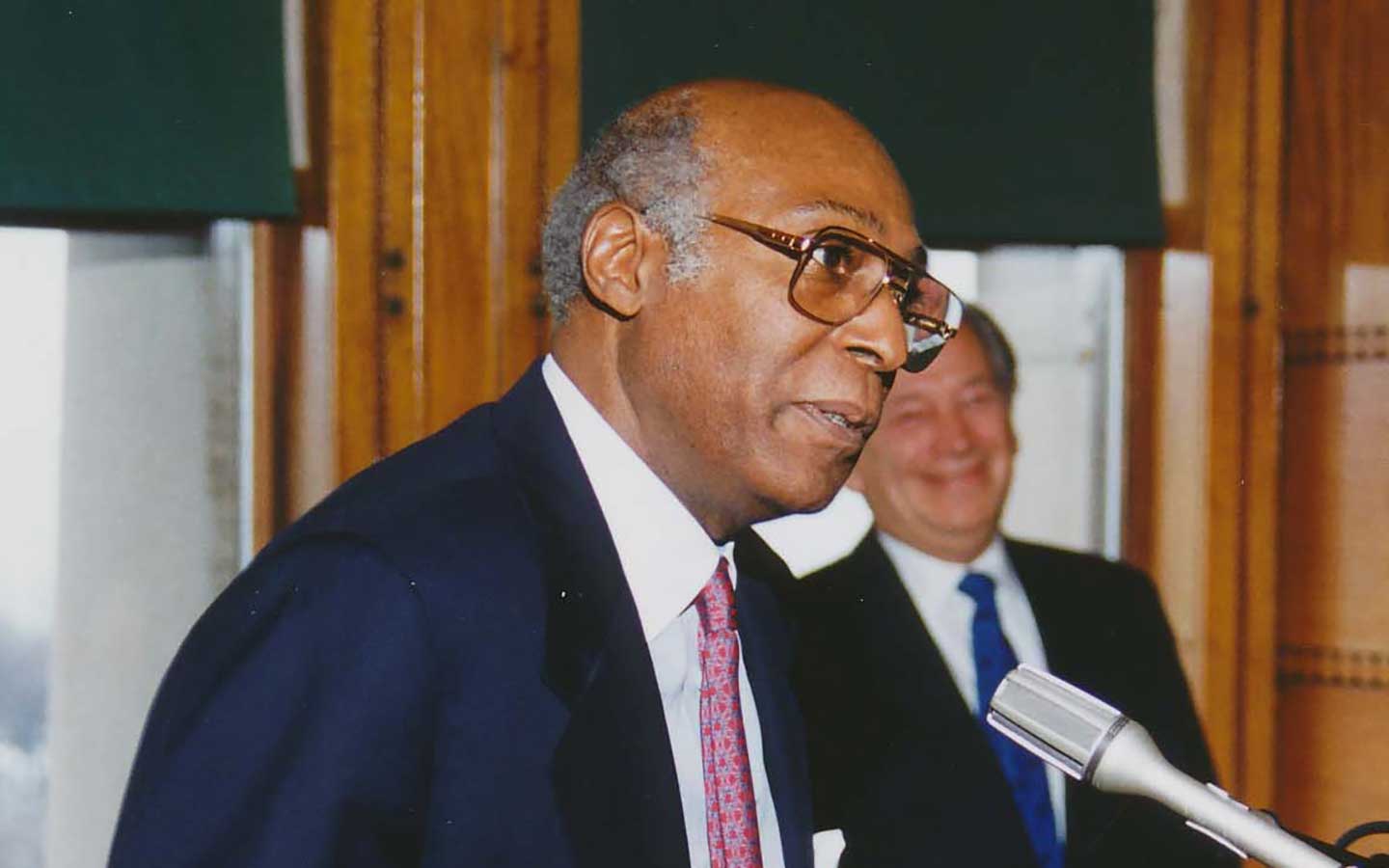
The Roosevelt University community mourns the passing and celebrates the life of civil rights leader, political scientist and alumni Charles V. Hamilton. He died on November 18, 2023 in Chicago at the age of 94.
Born in Oklahoma and raised on Chicago’s southside, Charles V. Hamilton’s career began after he graduated from Roosevelt with a degree in political science in 1951. He later earned a master’s degree from the University of Chicago before becoming a faculty member at Alabama’s Tuskegee Institute in 1958. There, Dr. Hamilton would develop a reputation as an unwavering supporter of the Civil Rights Movement and would encourage his students to engage with the controversial topic. One former student noted that Dr. Hamilton would encourage debate amongst his students, but with the caveat that they backup their claims with data. “Unsupported statements were not acceptable for political scientists,” was one of Hamilton’s common refrains.
After a short time, Dr. Hamilton left Tuskegee to pursue his PhD at the University of Chicago before holding faculty positions at Rutgers University, Lincoln University, Columbia University and, of course, Roosevelt University. He was a professor of political science at Roosevelt from 1967 until 1968. For Dr. Hamilton, a career in academia was more than being a professor, but a viable opportunity to involve students in activism. Outside of the classroom, Dr. Hamilton worked with the Student Nonviolent Coordinating Committee with civil rights figures like Kwame Ture. He truly was an example of the Roosevelt mission of education intersecting with social justice.
In 1967, Dr. Hamilton alongside Kwame Ture co-published the seminal text Black Power: the Politics of Liberation in America (1967). This revolutionary book traces the history of systemic racism in the United States, defines the meaning of “Black Power” and illustrates meaningful strategies for radical political reformation. Named the “Black Power Duo,” Hamilton and Ture would help guide the latter strategies of the civil rights movement and change how Black leadership and citizens would engage with politics in America and beyond. Dr. Hamilton is also credited as one of the originators of the term “institutional racism,” a phrase that addresses the disconnection between the reality and perception of racism in America drawn across color lines.
Hamilton would spend the rest of his career continuing to work as a political scientist and “academic activist.” He would go on to publish multiple books on different American political figures and continue to teach until his retirement in 1997. A lifelong Laker, Dr. Hamilton joined the Roosevelt University Board of Trustees in 2006. His commitment to the Roosevelt community was unwavering. In 2022, Dr. Hamilton and his wife Dana Cooper Hamilton established the Carol Hamilton Memorial Endowed Scholarship for Roosevelt students. The scholarship honors Hamilton’s daughter, Carol, who was press secretary to Commerce Secretary Ronald H. Brown. Carol was tragically killed in a 1996 crash of an Air Force plane in Croatia. Today, this scholarship honors Carol’s legacy by awarding one undergraduate student from the College of Humanities, Education, and Social Sciences.
On November 18, 2023, Charles V. Hamilton died in Chicago at the age of 94. University President Dr. Malekzadeh had this to say about the tragic loss:
“Dr. Hamilton was an exemplary individual, and Roosevelt is beyond proud to have called him one of our own: an alum, a faculty member, a trustee, and a friend. I often reflect upon the time I spent with him on April 26, 2023. In fact, it remains a highlight of my presidency—hosting Dr. Hamilton, Dr. Christopher Reed and his niece, Celeste James, on campus. Rarely do leaders have the privilege of meeting one of their university’s earliest alumni, particularly one as remarkable as Dr. Hamilton.”
His legacy remains one of yielding history and political analysis as a weapon to fight systemic oppression. The entire Roosevelt community mourns the loss of our esteemed alum and colleague as we reflect upon his incredible contributions to the betterment of our students and society.